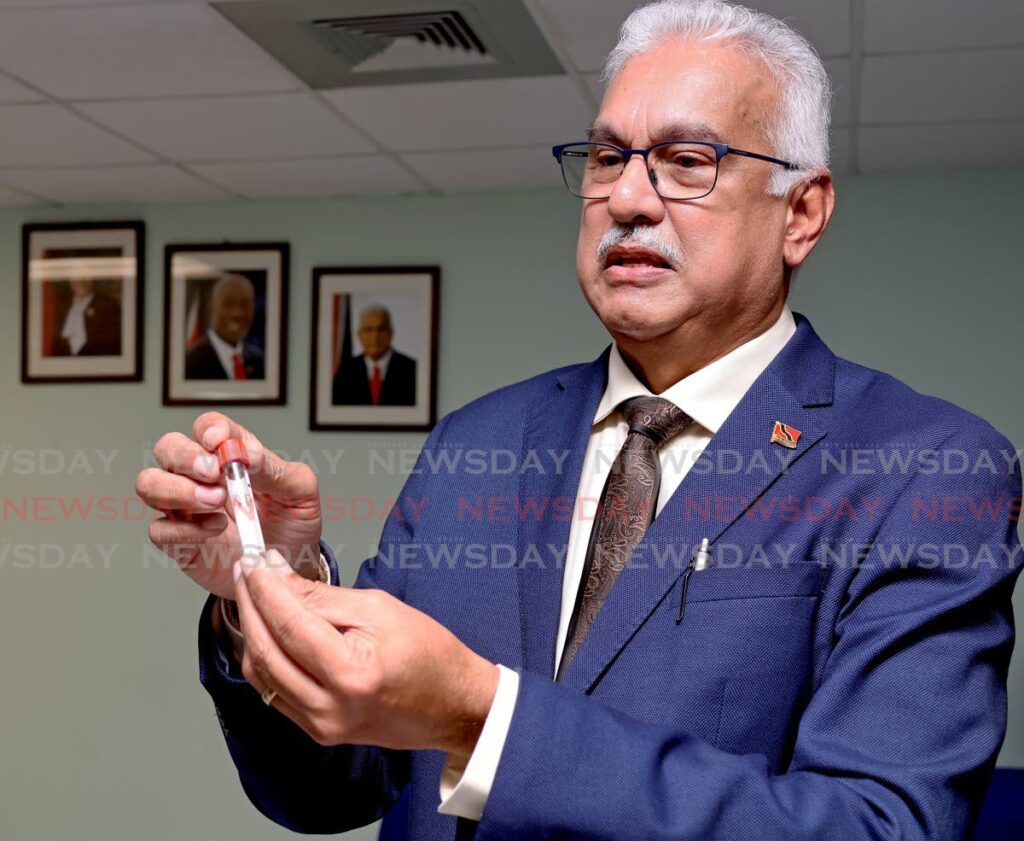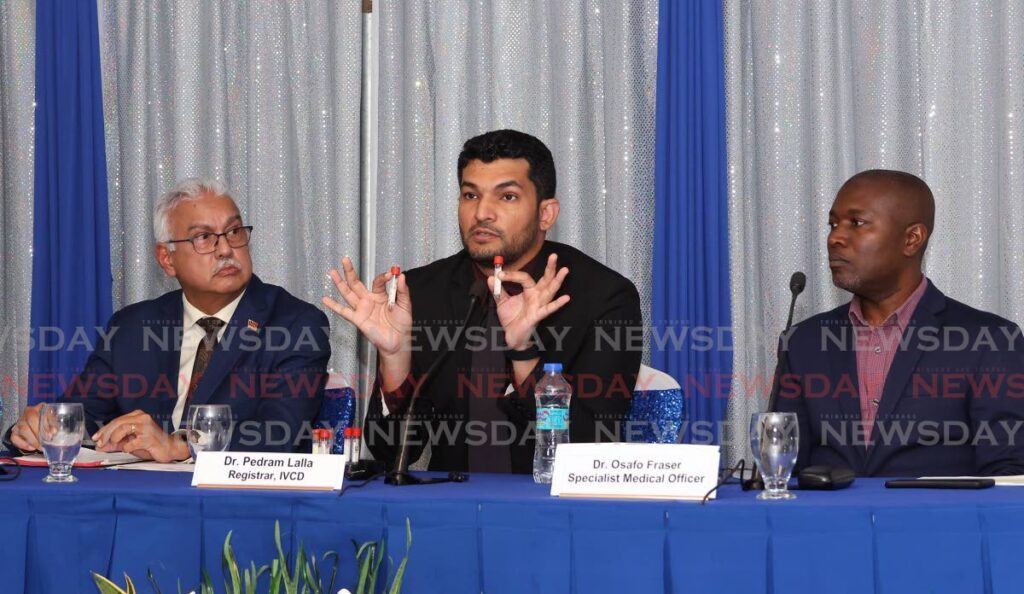Deyalsingh: Six-20 age group most vulnerable to dengue

HEALTH Minister Terrence Deyalsingh has said children and young people between six and 20 are most at risk from contracting dengue.
As someone who once had dengue fever, Deyalsingh says he empathises with everyone who has contracted the virus or knows someone who has.
He made these comments at a news conference at the San Fernando Teaching Hospital on July 25.
He told the media he has been advising people about taking the necessary precautions to protect themselves against dengue since he was appointed minister in 2015.
"By the way, I had dengue in 2015. So I know.
"My platelet levels dropped. I was hospitalised for two nights in Port of Spain (General Hospital). So I know what a dengue patient goes through."
Asked what groups of people are most vulnerable to contracting dengue, Deyalsingh said, "The age group between six and 20 years old is accounting for 78 per cent of the cases."
Withing this age group, he said, most of the cases involve children between 11 and 15 .
This is followed by children six-ten and people 16-20.
"So more younger people are being infected.
"We don't know why as yet. This is what the data is showing."
Asked whether older people with co-morbidities (other illnesses such as hypertension and heart disease) were also more vulnerable to dengue, Deyalsingh said, "Those most likely to succumb to severe dengue, especially several haemorrhagic dengue, where you have bleeding, are going to be the younger population, children, and the elderly with co-morbidities."
He added that children's immune systems are not fully developed, while those of elderly people with co-morbidities is compromised.
On safeguarding pregnant women and their babies against dengue, Deyalsingh said, "We have been doing a lot of work at our antenatal clinics through the directorate of women's health. I asked Dr (Adesh) Sirjuesingh (head of the directorate) since the start of the year. Remember, I went back to our activities since January (to sensitise the public to protect themselves against dengue). I made sure in our antenatal clinics, where 93 per cent of pregnant women come to have their children. We do lectures. We have talks and we give out brochures in all our antenatal clinics about mosquito borne diseases – zika, Chikungunya and dengue."
He added that the ministry also advises obstetricians and gynaecologists in the private sector to educate the other seven per cent of pregnant women, who come to them, about these diseases.

South-West Regional Health Authority manager (health promotion) Dr Sandi Arthur said the primary concern in this instance is pregnant women contracting zika.
Arthur recalled when a zika upsurge happened in 2016, it was shown there was "a risk to the newborn baby having congenital defects, more specifically the microcephaly (small heads)."
She said of dengue fever, "We have not seen or noted the birth defects or anything like that with them."
But Arthur added, "Pregnancy is one of those immunocompromised states. So we don't want them (pregnant women) to become unwell, because should they develop severe or haemorrhagic dengue fever, then it can have a negative impact on the outcome of that pregnancy, for the mother and the baby."
She said there had been no reports of any dengue-related maternal mortality.
Deyalsingh and head of SWRHA's accident and emergency (A&E) department Dr Reeta Moonesar said all hospitals are fully prepared to deal with dengue cases.
Referring to Deyalsingh's earlier statement that the number of dengue cases has risen from 450 to 509, Moonesar said there is a spike in cases and increasing hospitalisation (of dengue patients), but added: "Rest assured, there are pathways, clinical and otherwise, to address that, starting from the local health centre to the A&E to the (hospital) wards, and a system in place to manage such."
Moonesar said there are different classifications of dengue.
"Of course you are going to have your fever, your muscle pains, your myalgia, your arthralgia and that will easily subside. Treatment (for dengue) of course would be rest, hydration. Oral hydration as much as possible. Use your oral hydration salts, your coconut water, your water, Gatorade and so forth. Bed rest and paracetamol."
She advised against taking medication such as aspirin which could worsen dengue symptoms.
"What we are concerned about is those (patients) who present with warning signs."
Moonesar identified lack of appetite, vomiting, severe abdominal pain, extreme fatigue, bleeding from the gums and rashes as dengue symptoms which warrant people seeking immediate medical attention.
Medical personnel were asked whether dengue could kill people with illnesses such as cancer.
Arthur said, "When we look at cause of death, we may have multiple factors occurring in the same person. When we do write or issue a death certificate, what we put as the primary cause of death would be the condition that caused the death at that point in time.
"So someone may have a malignancy. They may have contracted dengue fever. However, if it is that they have dengue, but that's just because they had it at the same time, but they did not have a complication of the dengue that can be implicated as a cause of death, it would not be placed as a cause of death."
Arthur said in such cases, a co-existing illness is listed on a person's death certificate, "but it wouldn't be indicated as the primary cause (of death)."
Deyalsingh dismissed claims in the public domain about the number of dengue cases.
He reminded the media that dengue is endemic to Trinidad and Tobago and the country has been dealing with it since 1981.
After repeating the point that the Aedes aegypti mosquito only breeds in clear, clean, stagnant water, Deyalsingh recalled Diego Martin experiencing a huge outbreak of dengue cases a decade ago. But he added there are no swamps or natural bodies of dirty stagnant water there.
Deyalsingh said the ministry and other stakeholders are now aggressively dealing with dengue in the counties of Victoria, St Patrick and Caroni, where most of the cases have been reported.

Comments
"Deyalsingh: Six-20 age group most vulnerable to dengue"